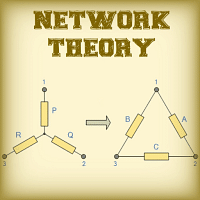Electrical Engineering (EE) Exam > Electrical Engineering (EE) Questions > Calculate the displacement current density wh...
Start Learning for Free
Calculate the displacement current density when the electric flux density is 20sin 0.5t.
- a)10sin 0.5t
- b)10cos 0.5t
- c)20sin 2t
- d)20cos 2t
Correct answer is option 'B'. Can you explain this answer?
| FREE This question is part of | Download PDF Attempt this Test |
Verified Answer
Calculate the displacement current density when the electric flux dens...
Answer: b
Explanation: The displacement current density is given by, Jd = dD/dt.
Jd = d(20sin 0.5t)/dt = 20cos 0.5t (0.5) = 10cos 0.5t.
Explanation: The displacement current density is given by, Jd = dD/dt.
Jd = d(20sin 0.5t)/dt = 20cos 0.5t (0.5) = 10cos 0.5t.
Most Upvoted Answer
Calculate the displacement current density when the electric flux dens...
Displacement Current Density Calculation
To calculate the displacement current density, we need to use the equation:
Jd = ε * dE/dt
where Jd is the displacement current density, ε is the permittivity of free space, and dE/dt is the rate of change of electric flux density.
Given that the electric flux density is 20sin(0.5t), we can differentiate it with respect to time to find dE/dt.
Differentiating Electric Flux Density
dE/dt = d/dt (20sin(0.5t))
Using the chain rule of differentiation, we can differentiate the sine function:
dE/dt = 10cos(0.5t) * d/dt (0.5t)
The derivative of 0.5t is 0.5, so we have:
dE/dt = 10cos(0.5t) * 0.5
Simplifying the expression, we get:
dE/dt = 5cos(0.5t)
Calculating Displacement Current Density
Now that we have the rate of change of electric flux density (dE/dt), we can calculate the displacement current density using the equation Jd = ε * dE/dt.
Given that ε is the permittivity of free space, which is a constant value, we can substitute the values:
Jd = ε * 5cos(0.5t)
Since the options given are in the form of a trigonometric function, we can rewrite the expression as:
Jd = 5εcos(0.5t)
Comparing this with the given options, we see that option 'B' is the correct answer:
Jd = 10cos(0.5t)
Conclusion
In conclusion, the displacement current density is calculated by differentiating the electric flux density with respect to time and then multiplying it by the permittivity of free space. In this case, the rate of change of electric flux density is 5cos(0.5t), leading to a displacement current density of 10cos(0.5t), which matches option 'B'.
To calculate the displacement current density, we need to use the equation:
Jd = ε * dE/dt
where Jd is the displacement current density, ε is the permittivity of free space, and dE/dt is the rate of change of electric flux density.
Given that the electric flux density is 20sin(0.5t), we can differentiate it with respect to time to find dE/dt.
Differentiating Electric Flux Density
dE/dt = d/dt (20sin(0.5t))
Using the chain rule of differentiation, we can differentiate the sine function:
dE/dt = 10cos(0.5t) * d/dt (0.5t)
The derivative of 0.5t is 0.5, so we have:
dE/dt = 10cos(0.5t) * 0.5
Simplifying the expression, we get:
dE/dt = 5cos(0.5t)
Calculating Displacement Current Density
Now that we have the rate of change of electric flux density (dE/dt), we can calculate the displacement current density using the equation Jd = ε * dE/dt.
Given that ε is the permittivity of free space, which is a constant value, we can substitute the values:
Jd = ε * 5cos(0.5t)
Since the options given are in the form of a trigonometric function, we can rewrite the expression as:
Jd = 5εcos(0.5t)
Comparing this with the given options, we see that option 'B' is the correct answer:
Jd = 10cos(0.5t)
Conclusion
In conclusion, the displacement current density is calculated by differentiating the electric flux density with respect to time and then multiplying it by the permittivity of free space. In this case, the rate of change of electric flux density is 5cos(0.5t), leading to a displacement current density of 10cos(0.5t), which matches option 'B'.
Attention Electrical Engineering (EE) Students!
To make sure you are not studying endlessly, EduRev has designed Electrical Engineering (EE) study material, with Structured Courses, Videos, & Test Series. Plus get personalized analysis, doubt solving and improvement plans to achieve a great score in Electrical Engineering (EE).

|
Explore Courses for Electrical Engineering (EE) exam
|

|
Similar Electrical Engineering (EE) Doubts
Calculate the displacement current density when the electric flux density is 20sin 0.5t.a)10sin 0.5tb)10cos 0.5tc)20sin 2td)20cos 2tCorrect answer is option 'B'. Can you explain this answer?
Question Description
Calculate the displacement current density when the electric flux density is 20sin 0.5t.a)10sin 0.5tb)10cos 0.5tc)20sin 2td)20cos 2tCorrect answer is option 'B'. Can you explain this answer? for Electrical Engineering (EE) 2024 is part of Electrical Engineering (EE) preparation. The Question and answers have been prepared according to the Electrical Engineering (EE) exam syllabus. Information about Calculate the displacement current density when the electric flux density is 20sin 0.5t.a)10sin 0.5tb)10cos 0.5tc)20sin 2td)20cos 2tCorrect answer is option 'B'. Can you explain this answer? covers all topics & solutions for Electrical Engineering (EE) 2024 Exam. Find important definitions, questions, meanings, examples, exercises and tests below for Calculate the displacement current density when the electric flux density is 20sin 0.5t.a)10sin 0.5tb)10cos 0.5tc)20sin 2td)20cos 2tCorrect answer is option 'B'. Can you explain this answer?.
Calculate the displacement current density when the electric flux density is 20sin 0.5t.a)10sin 0.5tb)10cos 0.5tc)20sin 2td)20cos 2tCorrect answer is option 'B'. Can you explain this answer? for Electrical Engineering (EE) 2024 is part of Electrical Engineering (EE) preparation. The Question and answers have been prepared according to the Electrical Engineering (EE) exam syllabus. Information about Calculate the displacement current density when the electric flux density is 20sin 0.5t.a)10sin 0.5tb)10cos 0.5tc)20sin 2td)20cos 2tCorrect answer is option 'B'. Can you explain this answer? covers all topics & solutions for Electrical Engineering (EE) 2024 Exam. Find important definitions, questions, meanings, examples, exercises and tests below for Calculate the displacement current density when the electric flux density is 20sin 0.5t.a)10sin 0.5tb)10cos 0.5tc)20sin 2td)20cos 2tCorrect answer is option 'B'. Can you explain this answer?.
Solutions for Calculate the displacement current density when the electric flux density is 20sin 0.5t.a)10sin 0.5tb)10cos 0.5tc)20sin 2td)20cos 2tCorrect answer is option 'B'. Can you explain this answer? in English & in Hindi are available as part of our courses for Electrical Engineering (EE).
Download more important topics, notes, lectures and mock test series for Electrical Engineering (EE) Exam by signing up for free.
Here you can find the meaning of Calculate the displacement current density when the electric flux density is 20sin 0.5t.a)10sin 0.5tb)10cos 0.5tc)20sin 2td)20cos 2tCorrect answer is option 'B'. Can you explain this answer? defined & explained in the simplest way possible. Besides giving the explanation of
Calculate the displacement current density when the electric flux density is 20sin 0.5t.a)10sin 0.5tb)10cos 0.5tc)20sin 2td)20cos 2tCorrect answer is option 'B'. Can you explain this answer?, a detailed solution for Calculate the displacement current density when the electric flux density is 20sin 0.5t.a)10sin 0.5tb)10cos 0.5tc)20sin 2td)20cos 2tCorrect answer is option 'B'. Can you explain this answer? has been provided alongside types of Calculate the displacement current density when the electric flux density is 20sin 0.5t.a)10sin 0.5tb)10cos 0.5tc)20sin 2td)20cos 2tCorrect answer is option 'B'. Can you explain this answer? theory, EduRev gives you an
ample number of questions to practice Calculate the displacement current density when the electric flux density is 20sin 0.5t.a)10sin 0.5tb)10cos 0.5tc)20sin 2td)20cos 2tCorrect answer is option 'B'. Can you explain this answer? tests, examples and also practice Electrical Engineering (EE) tests.

|
Explore Courses for Electrical Engineering (EE) exam
|

|
Suggested Free Tests
Signup for Free!
Signup to see your scores go up within 7 days! Learn & Practice with 1000+ FREE Notes, Videos & Tests.
























